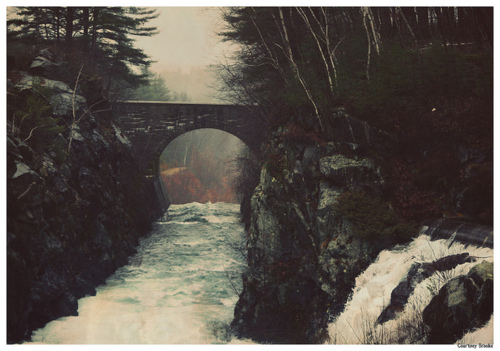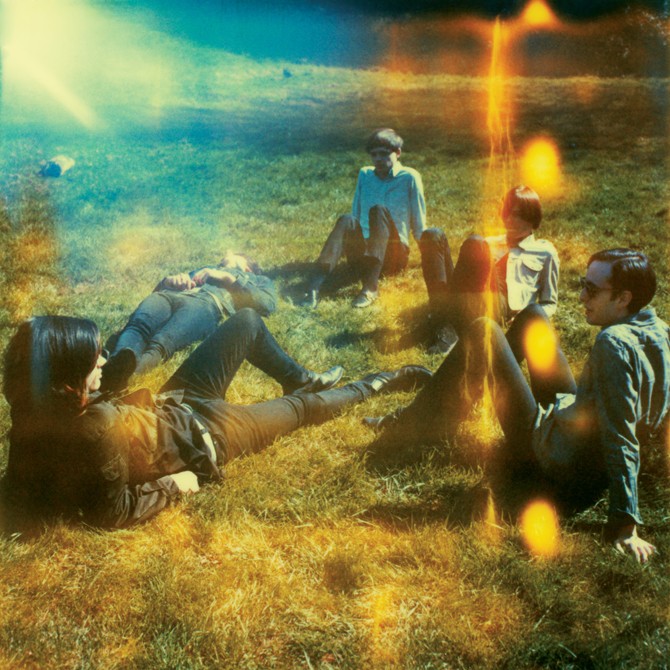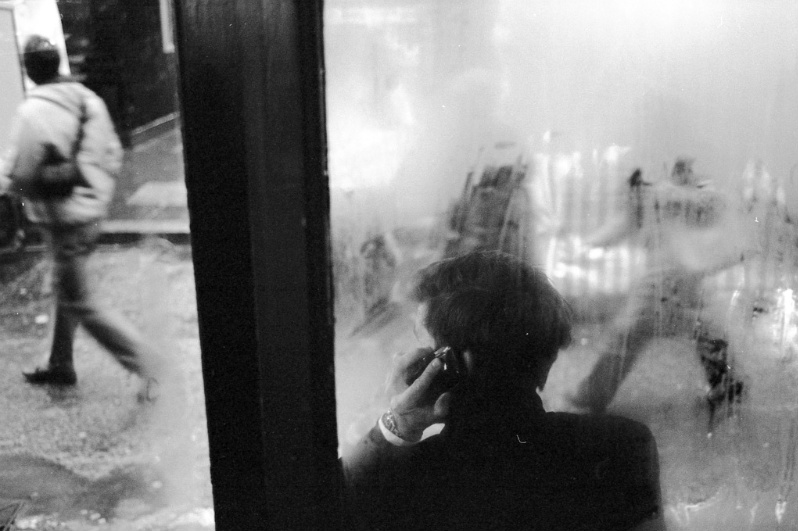“When I saw the prisoner step aside to avoid the puddle, I saw the mystery, the unspeakable wrongness, of cutting a life short when it is in full tide. This man was not dying, he was alive just as we were alive. All the organs of his body were working – bowels digesting food, skin renewing itself, nails growing, tissues forming – all toiling away in solemn foolery. His nails would still be growing when he stood on the drop, when he was falling through the air with a tenth-of-a-second to live. His eyes saw the yellow gravel and the grey walls, and his brain still remembered, foresaw, reasoned- reasoned even about puddles. He and we were a party of men walking together, seeing, hearing, feeling, understanding the same world; and in two minutes, with a sudden snap, one of us would be gone – one mind less, one world less.” George Orwell’s A Hanging, 1931.
Everything this person has written for TUNETHEPROLETARIAT
I would sail to you

James Vincent McMorrow – If I Had A Boat
Introducing himself through a spillage of humming sing-song, all alone, McMorrow allows this eventual dramatization time; time to breathe, time for a moment’s pondering, as he dips his feet into the cold crystal of his particular turmoil. Built in the isolation of an Irish beach house, “If I Had A Boat” is a surfeit of coveting change and thirst.
“I’m pointed north, hoping for the shore.”
As with the most approachable of contemporary folk music, it nestles in the ear as if heard before, and is entirely simplistic in its foundation, yet drenched in allaying melodies, rising from its quiet box of seclusion to a far-reaching moment of aural splendor. “Burn slow, burning up the back wall … Weeds grow through the lilies and the vine.” [Purr-chass.]
The centre of the world

Sidney Bechet – Si Tu Vois Ma Mere
There’s a whimsicality to Woody Allen’s fondling and measuring of life’s curiosities and starkness, and it doesn’t quite sit with the claim to himself be the room’s gloom. Reality, however, assumes it must sit quite agreeably, probably in a cross-legged gesture, otherwise where would the movies go? There would be no resulting art to speak of nor cured curiosity to honour dead cats. We’ll call it cognitive dissonance or maybe we’ll call it just getting along, but Allen has stared the banality of it all square in the nostril and concluded only that it too holds warmth and humour. Have you yet seen Midnight In Paris? It may be the only cozy corner in this rather circular – yet undirected – and fatalistic world; an unhurried and spacious ode to nostalgia is Midnight In Paris and, ironically, a knowing nod to that disconsolate yearning to be a great artist among greater artists. You’d be a ruddy fool not to see it; a silly git not to feel it. [Petite fleur.]
I can see through you

The Horrors – I Can See Through You
This little boy, he crept his head inside the already shyly opened door. There was no need, for the walls were glass, but he crept through anyway. He was just making sure. In the first corner to his left was a bin of used fabric softeners, empty water bottles, detergent canisters, but mostly cans and gum wrappers. He dipped his hand into this bin, this boy’s lucky-dip, scattered what was there – just enough to catch sight of items underneath – and unearthed a plastic bottle or possibly two. Into his bag they went and off he skipped to the other end of the Laundromat. For a boy searching bins, he looked happier than the rest of them.
He couldn’t have seen above the washing machines for his height, and it was a long room, yet he knew exactly where to go. He might have done this before, maybe yesterday. No winning ticket in that final dustbin either and so out the door he went and onto the sidewalk, clasping the loose jeans covering his father’s thick legs as he sold copied DVDs to no one. A girl, much older than the boy and much younger than the father, watched every step the boy had made. His smile was as infectious as the empathy for his situation, she thought to herself while passing through radio channels of bad music.
Knowing, she moved from her seat to the boot of her battered car – she was asked twice already that week did she need a repaint and someone else had offered $1,000 to take it away. The boy and the father had gathered their belongings into their red truck, their newer belongings, too, and were on their way. Like the boy opening the door, she waved them down. “Do you want more bottles?” Nothing. “Bottles,” and she pointed at the bag in the back of truck. “More?” “Sí!” And smiles.
The boy opened the truck door, jumped the height to the floor with a kind of excited plod and followed her to the car, his father chasing them through the truck mirrors. She opened the boot, the trunk, and pulled from it, with some effort, a garbage bag of empty water bottles she’d been keeping to avail of a chunky coupon at the local grocery store. Searching in bins … they might need it more, she figured. With it came some shoes and a bag of old clothes. The boy grabbed everything but the bottles before they hit the floor and tucked them back in, coyly taking the bag of plastic away as she smiled again and saluted towards the father. He didn’t see her; instead paralyzed by his son’s smile and the way he sat up beside him with a glance suggesting a sense of pride in their successful evening. [Skying.]
Trial and error: the search for virtue

Emmy The Great’s Virtue is an elegant record, touching upon the themes of religion, immigration, feminism, place, morality, and even climate change (in the most unique and approachable fashion). It’s astoundingly engaging and is – I say with readied gag reflex – a much more mature offering than 2009’s First Love. Emmy The Great’s Virtue is the best album I’ve heard this here year.
“Crane’s are lifting cargo to the sea …” “Dinosaur Sex”, an opener of engaging title, offers a theatrical edge, with the entrance of Middle Eastern horns and jungle birds broken only by reaching guitar. The juggling of power station imagery and Earth’s end etches a funereal march for humanity upon the song, like scars upon its pretty face, “Skin is peeling off of us in sheets”. It’s the end of the world. It’s the end of the world and she knows it. Or at least she dreams it. “Dinosaur sex led to nothing.” And might we? Emma-Lee Moss dreams so, and such despair bleeds through to “A Woman, A Woman, A Century Of Sleep”, as women lock-in their subservient roles, straighten their broken backs over boiling pots, morphing to objects for positioning and pleasure. Here there are great moments of depth to her voice, as well as a cinematic layering of messy backing vocals.
There’s intimate and telling disconnect on “Paper Forest (In The Afterglow Of Rapture)” as Moss elongates “I’m blessed” as if to force conviction. And the spiritual or religious attachments fail to be shunned following a first utterance, as “Creation” reads like a spoken instruction manual to the Genesis formula. There’s a perpetual line of creators within creators, and, whether intended or not, the song’s structure allows for Moss’ storytelling and her band’s instrumentation to feature in tandem. It’s a neat trick and breathes real strength into the core of the record.
“Exit Night / Julia’s Theme” brims over with the sort of painful and definite cycle of generations ending that the English grasp so well, capturing the death of a country and its people; death of an age, as certain as sunrise, and characters caught in-between, heads over shoulders with nostalgia and forward with fear. “An exit night is coming through – an exit night is coming for you.”
Such longing is cause for a stupendous interlude to the record’s penultimate track, “North”, a song whose narrator is in search for a sense of place and inclusion, speaking of land and borders and the uncelebrated arrival of the world’s immigrants: “I can’t help where I was born … if I take what I have to the North, is there room on your piece of heaven or would you turn me away again?” For the time we’re in, it’s a necessary and demanding commentary. It’s beyond the self, providing a clear gap between Emma and her peers. (Note the Dylan-styled delivery on “heaven”.)
Emmy The Great – Trellick Tower
Virtue’s closer, “Trellick Tower”, sets Moss on a course most personal and startlingly true: disclosing a lost fiancé and the vanquishing of their shared love as a result of his religious conversion, “He heard the voice I couldn’t hear … and now I’m praying for this pain to clear [yet] he’s waiting on ascension.” With admirable restraint, Moss shelves any desire to dampen the legitimacy of his decision or the subsequent pain endured, instead bathing in the flavourlessness of a home once of two but now just one.
As with every first listen, it’s a disconcerting matter to conclude anyone as either poetic or just wordy, but here it’s poetry that proves the triumphant battler. It wins in the musicality of her chosen words over any obvious classical poetic device. Variation of theme, if anything, is the triumphant winner. It works for me. Sure, this is just music and pales if not fondled by our own curiosities for the minds of storytellers, but this record has shapely depth and is stylised by terse observations over the most euphonic of instrumentation. It’s a serious offering and must be treated as such.
[Virtue: Album stream and track-by-track guide in her own words.] [Out today.]
She will burn your house down

Melanie Laurent – En T’Attendant
The setup is minimalistic: two thirds assuaging drawl, a teaspoon of scream, and the rest a composed offering of polished frenzy (think watered-down Funeral). The song’s arc forms not in its predictable structure, but in Laurent’s stirring delivery, birthing with scattered syllabic fumbling – vocalised jazz hands – over untranslated verse, soon weaving with choruses made distinct by a change in vocalised approach; a soothing stretch and pull of her words and their poetry – tormenting their mobility. The appeal is in the voice, of course. Sure, there’s enough to be had in the cohesive instrumental: the approachable freely-strummed guitar and the added decoration of pounding piano, timid trumpets, viola, and the confidence of aspiring backing vocals, but it is the vocals, in their palette so dry yet drenched in desire, that proves the adage of the French and their allure.
[Glorious.]
Sofija
Life’s never ending search for Lost In Translation‘s Official Soundtrack: Part Deux.
If you go down to the woods today

On this laptop, I have ten songs by eight individual artists splattered across my iTunes. Sabotage must’ve occurred while in-transit, leaving an army of thousands to not one sole soldier. Never mind, the headphone input is broken to the point where it picks up just the right or left ear and the basic layering of vocals and guitar only, and speaker quality borders on whispers of something boring to a deaf person. Plethroa or none, there’s no real use in worrying.
“So if you’re leaving with a bear tonight, for some lovin’ in the pale moonlight, well you know everything’s going to be all right.”
The car boasts a busted radio that gives off a straight line hiss just often enough to be reminded of its usefulness and a passenger window that fails to drop on any command – or by any attempted translation – to relieve my lungs of swamp-heat. Filling the air’s open space with my own voice is cause for concern, but mostly irritation. All the while I can’t remove this mess from my head. Without my library, things like this appeal. “I know you want it. You know you want it.” I don’t. I want my songs back.
[Hug.]
Spurious lands

Stephin Merritt – “Forever And A Day”
People, they visit lands and succumb to an overwhelming sense of place and belonging, as if cut from the same soil beneath them, as if made of discovered dirt. You’ve heard this before, and, isolation of shared experience apart, you trust in the merit. A home aside from home. Some place where loneliness waits as secondary. Maybe due to bucolic depictions, maybe due to a truth, Provence, France has always whispered to me with a curl of a finger. When forced from your own land, though, I wonder can such place be found or will the idyllic state of that which is left behind forever haunt?
I’m not certain what it means to be an Irish man of a time when men of similar and younger ages must flee for the most basic of chances. He was once a boy and he sang, “England is mine, it owes me a living!” It’s got the strength of a slogan, but he’s wrong. We’re owed nothing. And as long as we’re alive and willing to stand still, we’ll lie in wait for nothing. Our role is to adapt in line with the whim of others. We’re asked to leave behind the only green we know and live a pretence of building a home atop strangers. Get married to a Merritt song. It’ll last longer than land.
[Song: Nonesuch.com. Art: Yago Hortal.]